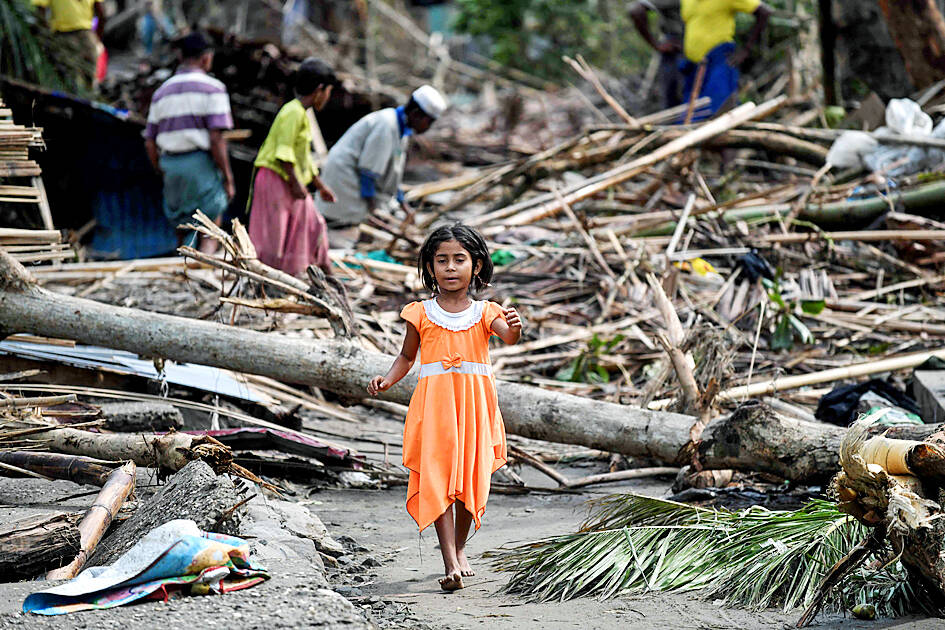Weather-related disasters have surged over the past 50 years, causing swelling economic damage even as early warning systems have meant dramatically fewer deaths, the UN said yesterday.
Extreme weather, climate and water-related events caused 11,778 reported disasters between 1970 and 2021, new figures from the UN’s World Meteorological Organization (WMO) show.
Those disasters killed just more than 2 million people and caused US$4.3 trillion in economic losses.

Photo: AFP
“The most vulnerable communities unfortunately bear the brunt of weather, climate and water-related hazards,” WMO Secretary-General Petteri Taalas said in a statement.
The report found that more than 90 percent of reported deaths worldwide due to disasters over the 51-year period occurred in developing countries.
However, the agency also said improved early warning systems and coordinated disaster management had significantly reduced the human casualty toll.
WMO said in a report issued two years ago covering disaster-linked deaths and losses between 1970 and 2019 that at the beginning of the period, the world was seeing more than 50,000 such deaths each year.
By the 2010s, the disaster death toll had dropped to below 20,000 annually.
In its update of that report, WMO yesterday said that 22,608 disaster deaths were recorded globally in 2020 and 2021 combined.
Cyclone Mocha, which wreaked havoc in Myanmar and Bangladesh last week, exemplifies this, Taalas said.
Mocha “caused widespread devastation ... impacting the poorest of the poor,” he said.
However, while Myanmar’s junta has put the death toll from the cyclone at 145, Taalas said that during similar disasters in the past, “both Myanmar and Bangladesh suffered death tolls of tens and even hundreds of thousands of people.”
“Thanks to early warnings and disaster management these catastrophic mortality rates are now thankfully history. Early warnings save lives,” he said.
The UN has launched a plan to ensure all nations are covered by disaster early warning systems by the end of 2027.
Endorsing that plan figures among the top strategic priorities during a meeting of WMO’s decisionmaking body, the World Meteorological Congress, which opened yesterday.
To date, only half of countries have such systems in place.
Meanwhile, WMO said that while deaths have plunged, the economic losses incurred when weather, climate and water extremes hit have soared.
The agency previously recorded that economic losses increased sevenfold between 1970 and 2019, rising from US$49 million per day during the first decade to US$383 million per day in the final one.
Wealthy countries have been hardest hit by far in monetary terms. The US alone incurred US$1.7 trillion in losses, or 39 percent of economic losses globally due to disasters since 1970.
However, while the dollar figures on losses suffered in poorer nations were not particularly high, they were far higher in relation to the size of their economies, WMO said.
Developed nations accounted for more than 60 percent of losses due to weather, climate and water disasters, but in more than four-fifths of cases, the economic losses were equivalent to less than 0.1 percent of GDP.
No disasters saw reported economic losses greater than 3.5 percent of the respective GDPs.
By comparison, in 7 percent of the disasters to hit the world’s least developed countries, losses equivalent to more than 5 percent of their GDP were reported, with several disasters causing losses equivalent to nearly one-third of GDP.
For small island developing states, one-fifth of disasters saw economic losses of more than 5 percent of GDP, with some causing economic losses above 100 percent.

The Philippines yesterday said its coast guard would acquire 40 fast patrol craft from France, with plans to deploy some of them in disputed areas of the South China Sea. The deal is the “largest so far single purchase” in Manila’s ongoing effort to modernize its coast guard, with deliveries set to start in four years, Philippine Coast Guard Commandant Admiral Ronnie Gil Gavan told a news conference. He declined to provide specifications for the vessels, which Manila said would cost 25.8 billion pesos (US$440 million), to be funded by development aid from the French government. He said some of the vessels would

Hundreds of thousands of Guyana citizens living at home and abroad would receive a payout of about US$478 each after the country announced it was distributing its “mind-boggling” oil wealth. The grant of 100,000 Guyanese dollars would be available to any citizen of the South American country aged 18 and older with a valid passport or identification card. Guyanese citizens who normally live abroad would be eligible, but must be in Guyana to collect the payment. The payout was originally planned as a 200,000 Guyanese dollar grant for each household in the country, but was reframed after concerns that some citizens, including

Airlines in Australia, Hong Kong, India, Malaysia and Singapore yesterday canceled flights to and from the Indonesian island of Bali, after a nearby volcano catapulted an ash tower into the sky. Australia’s Jetstar, Qantas and Virgin Australia all grounded flights after Mount Lewotobi Laki-Laki on Flores island spewed a 9km tower a day earlier. Malaysia Airlines, AirAsia, India’s IndiGo and Singapore’s Scoot also listed flights as canceled. “Volcanic ash poses a significant threat to safe operations of the aircraft in the vicinity of volcanic clouds,” AirAsia said as it announced several cancelations. Multiple eruptions from the 1,703m twin-peaked volcano in

A plane bringing Israeli soccer supporters home from Amsterdam landed at Israel’s Ben Gurion airport on Friday after a night of violence that Israeli and Dutch officials condemned as “anti-Semitic.” Dutch police said 62 arrests were made in connection with the violence, which erupted after a UEFA Europa League soccer tie between Amsterdam club Ajax and Maccabi Tel Aviv. Israeli flag carrier El Al said it was sending six planes to the Netherlands to bring the fans home, after the first flight carrying evacuees landed on Friday afternoon, the Israeli Airports Authority said. Israeli Prime Minister Benjamin Netanyahu also ordered